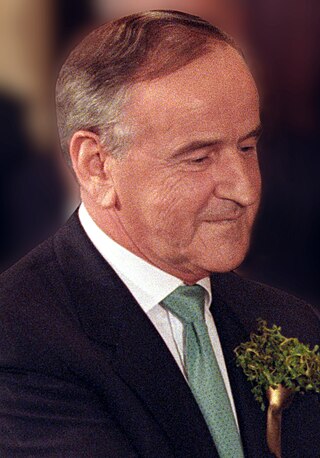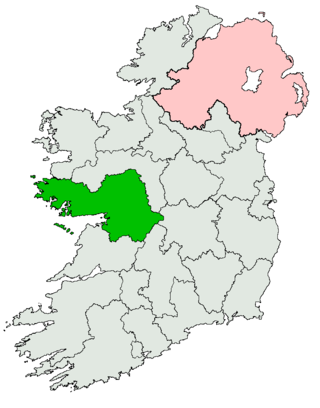
The 2002 Irish general election to the 29th Dáil was held on Friday, 17 May, just over three weeks after the dissolution of the 28th Dáil on Thursday, 25 April by President Mary McAleese, at the request of the Taoiseach, Bertie Ahern. The general election took place in 42 Dáil constituencies throughout Ireland for 166 seats in Dáil Éireann, the house of representatives of the Oireachtas, with a revision of constituencies since the last election under the Electoral (Amendment) Act 1998.

The 1992 Irish general election to the 27th Dáil was held on Wednesday, 25 November, almost three weeks after the dissolution of the 26th Dáil on 5 November by President Mary Robinson, on the request of Taoiseach Albert Reynolds following a defeat of the government in a motion of confidence. The general election took place in 41 Dáil constituencies throughout Ireland for 166 seats in Dáil Éireann, the house of representatives of the Oireachtas, under a revision in the Electoral (Amendment) Act 1990. Three referendums on abortion were held on the same date.

The 1987 Irish general election to the 25th Dáil was held on Tuesday, 17 February, four weeks after the dissolution of the 24th Dáil on 20 January by President Patrick Hillery, on the request of Taoiseach Garret FitzGerald. A continuing crisis over public finance and a rejection of the budget had led to the Labour Party withdrawing from the Fine Gael–led coalition government. The general election took place in 41 Dáil constituencies throughout Ireland for 166 seats in Dáil Éireann, the house of representatives of the Oireachtas. There were minor amendments to constituency boundaries under the Electoral (Amendment) Act 1983.

The November 1982 Irish general election to the 24th Dáil was held on Wednesday, 24 November, three weeks after the dissolution of the 23rd Dáil on 4 November by President Patrick Hillery, on the request of Taoiseach Charles Haughey following a defeat of the government in a motion of confidence. The general election took place in 41 Dáil constituencies throughout Ireland for 166 seats in Dáil Éireann, the house of representatives of the Oireachtas.

The February 1982 Irish general election to the 23rd Dáil was held on Thursday, 18 February, three weeks after the dissolution of the 22nd Dáil on 27 January by President Patrick Hillery on the request of Taoiseach Garret FitzGerald on the defeat of the government's budget. The general election took place in 41 Dáil constituencies throughout Ireland for 166 seats in Dáil Éireann, the house of representatives of the Oireachtas.

The 1981 Irish general election to the 22nd Dáil was held on Thursday, 11 June, following the dissolution of the 21st Dáil on 21 May by President Patrick Hillery on the request of Taoiseach Charles Haughey. The general election took place in 41 Dáil constituencies throughout Ireland for 166 seats in Dáil Éireann, the house of representatives of the Oireachtas. The number of seats in the Dáil was increased by 18 from 148 under the Electoral (Amendment) Act 1980.
In Ireland, direct elections by universal suffrage are used for the President, the ceremonial head of state; for Dáil Éireann, the house of representatives of the Oireachtas or parliament; for the European Parliament; and for local government. All elections use proportional representation by means of the single transferable vote (PR-STV) in constituencies returning three or more members, except that the presidential election and by-elections use the single-winner analogue of STV, elsewhere called instant-runoff voting or the alternative vote. Members of Seanad Éireann, the second house of the Oireachtas, are partly nominated, partly indirectly elected, and partly elected by graduates of particular universities.

Mayo is a parliamentary constituency represented in Dáil Éireann, the lower house of the Irish parliament or Oireachtas. The constituency elects 4 deputies on the system of proportional representation by means of the single transferable vote (PR-STV).

Waterford is a parliamentary constituency represented in Dáil Éireann, the lower house of the Irish parliament or Oireachtas. The constituency elects 4 deputies on the system of proportional representation by means of the single transferable vote (PR-STV).

Wicklow is a parliamentary constituency represented in Dáil Éireann, the lower house of the Irish parliament or Oireachtas. The constituency elects 5 deputies on the system of proportional representation by means of the single transferable vote (PR-STV).

The 2007 Irish general election took place on Thursday, 24 May after the dissolution of the 29th Dáil by the President on 30 April, at the request of the Taoiseach. The general election took place in 43 parliamentary constituencies throughout Ireland for 166 seats in Dáil Éireann, the lower house of parliament, with a revision of constituencies since the last election under the Electoral (Amendment) Act 2005.
Limerick East was a parliamentary constituency represented in Dáil Éireann, the lower house of the Irish parliament or Oireachtas from 1948 to 2011. The method of election was proportional representation by means of the single transferable vote (PR-STV).
Cork South-Central is a parliamentary constituency represented in Dáil Éireann, the lower house of the Irish parliament or Oireachtas. The constituency elects 4 deputies on the system of proportional representation by means of the single transferable vote (PR-STV).
Dublin South-Central is a parliamentary constituency represented in Dáil Éireann, the lower house of the Irish parliament or Oireachtas. The constituency elects 4 deputies on the system of proportional representation by means of the single transferable vote (PR-STV).

Dublin South-West is a parliamentary constituency represented in Dáil Éireann, the lower house of the Irish parliament or Oireachtas. The constituency elects 5 deputies on the system of proportional representation by means of the single transferable vote (PR-STV).

Dublin West is a parliamentary constituency represented in Dáil Éireann, the lower house of the Irish parliament or Oireachtas. The constituency elects 4 deputies on the system of proportional representation by means of the single transferable vote (PR-STV).

Galway was a parliamentary constituency represented in Dáil Éireann, the lower house of the Irish parliament or Oireachtas from 1921 to 1937. The method of election was proportional representation by means of the single transferable vote (PR-STV).

The 2016 Irish general election took place on Friday 26 February to elect 158 Teachtaí Dála (TDs) across 40 constituencies to Dáil Éireann, the lower house of the Oireachtas, Ireland's parliament. The 31st Dáil was dissolved by President Michael D. Higgins on 3 February, at the request of Taoiseach Enda Kenny. There was a reduction of eight seats under the Electoral (Amendment) Act 2013.
This is a list of the members elected to the 32nd Dáil Éireann, the lower house of the Oireachtas (legislature) of Ireland. These TDs were elected at the 2016 general election on 26 February. That general election took place throughout the state to elect 158 members of Dáil Éireann, a reduction of 8 from the prior number of 166. This followed the passing of the Electoral (Amendment) Act 2013.
The next Irish general election to Dáil Éireann, the lower house of Ireland's parliament, the Oireachtas, will be held by March 2025, to elect between 171 and 181 TDs across Dáil constituencies of between 3 and 5 seats.








